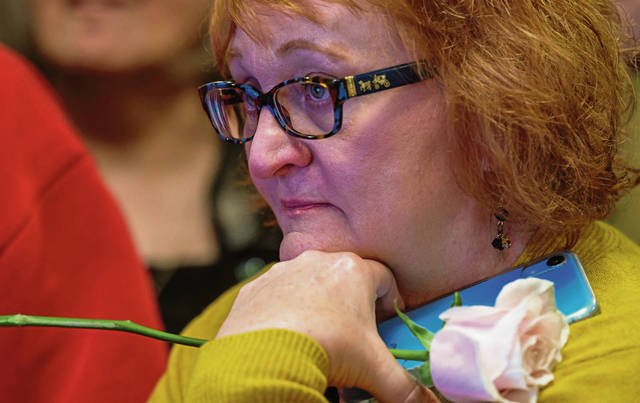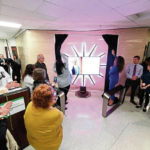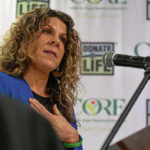Swallowing tears, Joy Krumenacker faced the packed lobby of Allegheny General Hospital on Pittsburgh’s North Side.
“Fifteen months ago, I entered this hospital to spend my very last weekend with my son,” she began.
Allegheny General Hospital and the Center for Organ Recovery & Education (CORE) unveiled a memorial Wednesday afternoon, commemorating deceased organ donors and their families. The ceremony included speeches from several health care professionals and a member of Pittsburgh City Council.
Krumenacker of Brackenridge was there to represent donor families.
She told of how her son, 17-year-old Eli Bussotti, died in car accident in October 2018 on his way home from his classes as a senior at Highlands High School. He was less than two blocks from home, she said. Just a day after his accident, Krumenacker said they quickly completed all of the necessary paperwork for Eli to become an organ donor. Upon his death, he donated seven organs to six recipients.
“My son continues to do so much good in the world,” she said.
Krumenacker has been a staunch advocate for organ donation ever since.
The memorial, which is a statue, is meant to expand on the hospital’s existing donor recognition services, said Alyssa McQuillen, in-house coordinator for CORE. McQuillen said Allegheny General hosts a flag-raising ceremony and rose ceremony every April, which is recognized as National Donate Life Month. The new statue provides a permanent location for families to reflect on their relative’s sacrifice.
“The memorial is something that is a good place for donor families to come and reflect and remember their loved one,” McQuillen said. “And know that it’s not the end of their story. They are living on.”
The statue’s design is reminiscent of a clock, to represent “time that was lost and time that was gained and remains valuable to all of us,” said Jeffery Cohen, chief physician executive of Community Health and Innovation for Highmark Health.
Around the perimeter of the clock are words that were carefully chosen after months of planning, said Susan Stuart, CEO of CORE. Among them are the words hero, gift, life, strength, legacy, compassion and hope.
The center of the memorial is a monitor, which displays images of deceased organ donors along with a few sentences about their lives.
“As donor families, you are a beacon of hope for those still waiting for a transplant,” Stuart said. “You have shown them that there is a reason for hope, and hope is the anchor that keeps them holding on.”
Following Wednesday’s ceremony, family members of deceased donors placed pink roses near the statue, in remembrance of their relatives.
Cohen said the ceremony was the first official milestone in Allegheny General’s Donate Life Challenge — an initiative with CORE, the Hospital and Healthsystem Association of Pennsylvania and the Pennsylvania Department of Health to raise awareness and programming around organ donation.
CORE recently made a goal to get at least 50% of Pennsylvania residents registered as organ donors in 2020.
In 2019, Allegheny General performed nearly 150 transplants with organs from deceased donors. But organ donation has stagnating across the United States, creating a shortage of available organs for transplant. As a result, some hospitals, like UPMC, are focusing more energy on living donor transplantation.
That’s why the memorial is so important to her, Krumenacker said.
“I think when you see the faces of the people who were donors and you see that brief little quote about them and their life, that really connects you to that person and the beauty of this process,” Krumenacker said. “In my darkest time, that is what brought light to my heart.”













